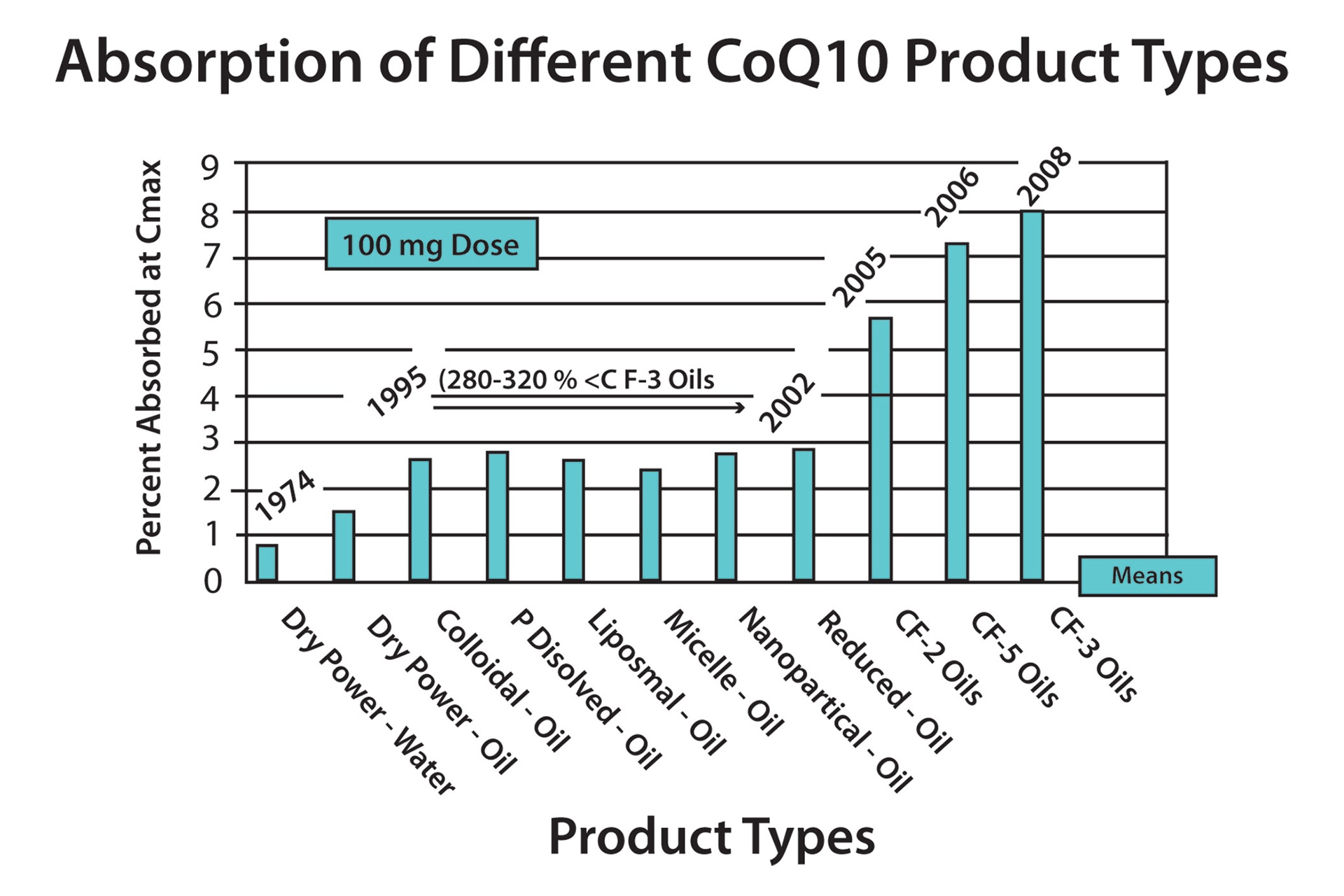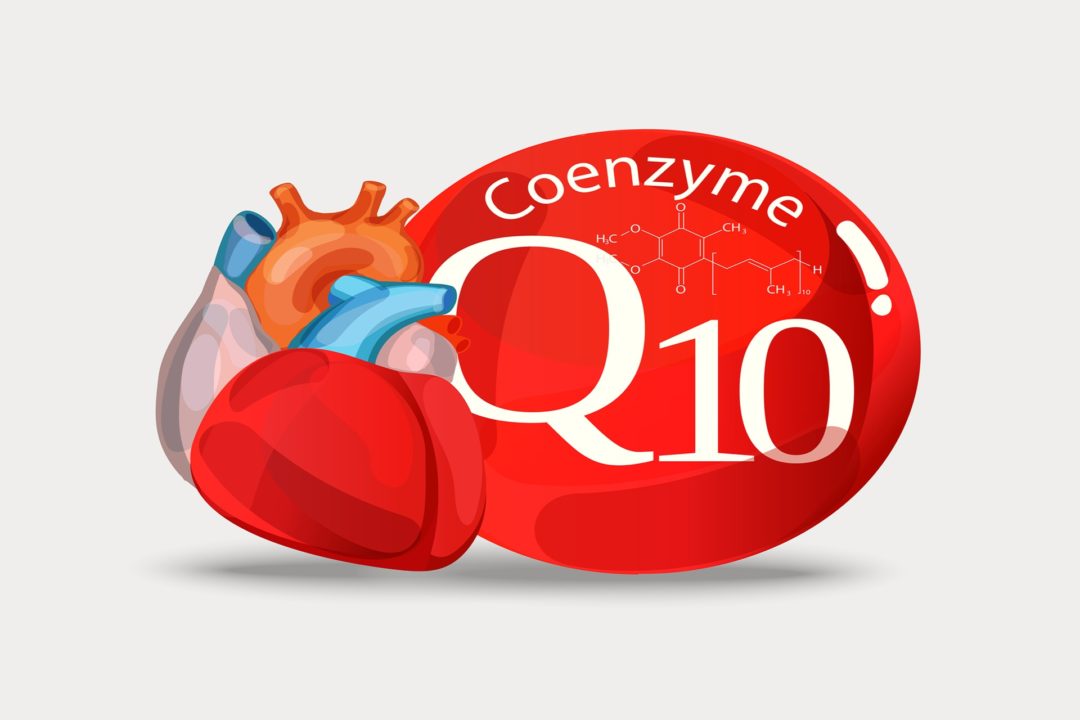In Part 2, we will discuss the absorption of the ubiquinol form of Coenzyme Q10 and then look at a head-to-head comparison of the absorption of ubiquinone and ubiquinol. In this comparison, the ubiquinone form is twice as well absorbed as the ubiquinol form. Both forms of Coenzyme Q10 are important supplements and what is of practical importance to consumers is to have sufficient blood and cellular levels, no matter which form or what absorption efficiency, or what strength is chosen. Dr. Judy will discuss suggested quantities for the various forms.

William V. Judy, Ph.D., earned a Ph.D. in physiology and bio-physics from West Virginia University in 1971. Dr. Judy taught physiology for many years in the Indiana University College of Medicine, and he has been doing research on the absorption and effects of Coenzyme Q10 for 46 years. His initial work was in collaboration with Dr. Karl Folkers, University of Texas, whom he collaborated with for more than 27 years. He was one of the first researchers to run long-term clinical trials, spanning 30 years or longer, on hundreds of cardiac patients, many of whom had been “left to die” by the medical establishment.
Dr. Judy is the co-author of six medical textbooks (Physiology and Biophysics). His latest book on Coenzyme Q10, “The Substance that Powers Life: Coenzyme Q10, An Insider’s Guide,” was published near the end of 2018. Dr. Judy’s research findings have been presented in six scientific reviews on coenzyme Q10. His research group has done over 80 single-dose Coenzyme Q10 absorption and bioavailability studies in the past 40 years.
Dr. Judy has been an expert witness on six lawsuits relative to CoQ10. The last lawsuit was between a USA and a Swiss company.
Dr. Judy is currently the chairman of the Southeastern Institute for Biomedical Research (SIBR), Inc., a clinical research support center for the pharmaceutical and natural products industries. SIBR Inc. is a contract research center that conducts clinical trials on natural products for the international community. Dr. Judy has traveled the world, lecturing to physicians, health care professionals and scientists about the benefits of Coenzyme Q10 in health maintenance and disease prevention.
Passwater: In Part 1, we discussed that science has shown that ubiquinol is converted to ubiquinone in the gut BEFORE absorption. After absorption ubiquinone is converted to ubiquinol in the blood (the blood doesn’t produce energy, so ubiquinone is not needed there). When transported into the cells from the blood, the ubiquinol is converted back to ubiquinone and then cycles back and forth between the two forms to produce energy. Ubiquinol per se is not absorbed at all...it is first converted to ubiquinone by the oxidative gastric juices.
The amount of Coenzyme Q10 absorbed from various supplements is another matter. Here we are not talking about pure compounds, but mixtures prepared under differing conditions. Coenzyme Q10 supplements are rarely just one form or the other...such as powdered crystalline ubiquinone...which is poorly absorbed. Most Coenzyme Q10 supplements today also include other compounds... such as an oil or pepper... to improve absorption. Preheating the CoQ10 (either form) to make it crystal-free, also improves absorption. The amount of Coenzyme Q10 that reaches the bloodstream is a factor of ALL of the ingredients in the supplement, not just the form of Coenzyme Q10 used. That is why clinical studies published in the peer-reviewed scientific journals have shown that today, there are ubiquinone supplements that are better absorbed and more bioavailable than any ubiquinol supplement tested. Tomorrow that could change as manufacturers may improve their formulations. Thus, one cannot walk down the aisle of a store and say that “Ubiquinol supplements cost more because they are better absorbed.”
Dr. Judy, in Part 1, you mentioned the misconception circulated on the internet that ubiquinol is always the better absorbed form of Coenzyme Q10. How did this misconception come about?
Judy: It may have originated by misapplying the results based on a study done by Dr. Hosoe of Japan (2006). Someone compared his result with the Parkinson’s study by Beal, Shultz and Hass done 10-15 years before the Hosoe study. This older study used a dry powdered crystalline form of ubiquinone which is poorly absorbed but was just about all we had back then. There was a 800% difference. This was a misapplication and not good science mainly because it was not a head-on study. And, of course, it did not test all forms of ubiquinone nor all ubiquinone supplements. Today, the peer-reviewed scientific literature shows that ubiquinone supplements can be twice as well absorbed as some good ubiquinol supplements.
These studies were done more than 10 years apart. Different study subject, different laboratories, different investigators, different analytical labs and different protocols were used in this so-called comparison study. It was not a scientifically sound comparison. The current studies show that this comparison was incorrect (14). Until 2018, we did not see any head-to-head comparisons of the absorption of ubiquinone Coenzyme Q10 and ubiquinol.
Passwater: Well, since the original comparison is scientifically inaccurate, do we have a good head-to-head comparison study now?
Judy: Yes, and the study shows that the absorption of a well-formulated ubiquinone Coenzyme Q10 product is about 200% better absorbed than good ubiquinol products tested.
Professors Dr. Guillermo Lopez-Lluch and Dr. Placido Navas and a team at a university in Sevilla, Spain, did a head-to-head study and presented the results at the Coenzyme Q10 conference at Columbia University in June of 2018 (14). Their results showed that a well-formulated ubiquinone Coenzyme Q10 product is significantly better absorbed than a well-formulated ubiquinol product. There is the documentation.
By the way, the ubiquinone Coenzyme Q10 product used in Dr. Mortensen’s Q-Symbio Study and in Professor Alehagen’s KiSel-10 Study also outperformed five other ubiquinone Coenzyme Q10 products.
Figure 4 is a composite of absorption levels from various types of Coenzyme Q10 formulations measured in the Southeastern Institute of Biomedical Research (SIBR) over several years.

Passwater: What does that tell you?
Judy: It tells me that the important thing with respect to absorption of Coenzyme Q10 is the composition of the oil matrix in which the Coenzyme Q10 is dissolved and the heating and cooling processes used prior to filling the Coenzyme Q10 and oil mix into the soft-gel capsules. Other components such as pepper and glycerides, as well as heating and cooling processes, can also improve absorption.
Yes, a good ubiquinol product will be absorbed better than a poorly formulated ubiquinone product. We knew that already.
The thing is, now we have documentation that a good ubiquinone Coenzyme Q10 product will give a better absorption than a good ubiquinol product.
As I mentioned, a recent published head-on comparison study between a well formulated ubiquinol and ubiquinone showed that the ubiquinone was 200% better absorbed than the ubiquinol (14).
Passwater: In other words, that ubiquinone Coenzyme Q10 product was twice as well absorbed than the well-formulated ubiquinol form of Coenzyme Q10 used for comparison. OK, I think that the scientific evidence is now clear. Both forms of Coenzyme Q10 are good and essentially equal supplements, but that some formulations are better absorbed than others. At this time, a ubiquinone form of Coenzyme Q10 is two times better absorbed than any ubiquinol form tested. What is important is the amount of Coenzyme Q10 in your blood.
Rather than rely on old myths, consumers need to ask what the actual absorption is for each product. So much depends on other compounds in the products and the physical form of the active ingredient—more so than the chemical form.
Dr. Judy, do we know what the optimal healthy range is for Coenzyme Q10 in the blood? Why worry about blood levels if we already have the optimal amount in the blood? What are typical values in the U.S. population?
Judy: Remember, there is considerable variation in individuals’ bio-synthesis of Coenzyme Q10 and in their dietary intakes of Coenzyme Q10. So, you have unsupplemented individuals with high, medium, and low plasma Coenzyme Q10 levels.
Typical unsupplemented plasma Coenzyme Q10 levels range from 0.65 to 1.25 micrograms per milliliter. The Cleveland Clinic says on its website that the population reference range extends from 0.36 to 1.59 mcg/mL. But plasma Coenzyme Q10 levels below 0.6 mcg/mL begin to scare me.
Passwater: You have long studied the levels of Coenzyme Q10 needed to bring clinical benefits in various disease. Since there is no RDA for Coenzyme Q10, is there a suggested optimal range for optimal health? Are there ranges that are effective as an adjunct in the treatment of various diseases?
Judy: For a long time, we thought that we needed to raise the plasma CoQ10 levels above 2.5 mcg/mL to have a preventive or therapeutic effect in heart failure patients and high blood pressure patients.
At the Coenzyme Q10 research conference at Columbia University in June 2018, there seemed to be a consensus that 3.5 mcg/mL is a good target for preventive and therapeutic purposes.
Healthy individuals will want to keep their plasma Coenzyme Q10 levels above 2.5 mcg/mL. Individuals with chronic heart failure, chronic fatigue syndrome, high blood pressure, etc. will want to raise their plasma Coenzyme Q10 to somewhere between 2.5 and 3.5 mcg/mL.
Fortunately, Coenzyme Q10 supplements are safe and well-tolerated and without any toxic effects. Another reassuring thing about Coenzyme Q10 supplementation is that cessation of the Coenzyme Q10 supplementation will not adversely affect the body’s bio-synthesis of Coenzyme Q10. But, for most individuals aged 40 and above, Coenzyme Q10 supplementation should be a life-long therapy because our human bio-synthesis of Coenzyme Q10 declines as we age.
Passwater: I am a huge advocate of measuring blood levels, of critical nutrients, not just taking a suggested amount. Science is all about measurement, not guessing. How would one have their blood Coenzyme Q10 level measured? Is it a standard test one can ask their health care practitioner to have done for them?
Judy: Physicians can get plasma Coenzyme Q10 levels analysis from the Quest and Precision Laboratories companies. I have tried both. They are expensive ($150/sample), but sometimes insurance will pay for them.
Passwater: Individuals can also obtain Coenzyme Q10 blood analysis without a prescription at a lower cost from Life Extension and HealthLabs.com (15,16). However, I find that many, if not most, people will not have their blood Coenzyme Q10 levels measured.
In lieu of actually measuring one’s blood level of coenzyme Q-10, what can we conclude about the dosages that people commonly take for dietary supplementation? They seem to choose a Coenzyme Q10 supplement based on the number of milligrams in a capsule, yet there is little information as to how much that will increase the blood levels of Coenzyme Q10. Is there a “rule of thumb” of how much the typical person’s blood level of Coenzyme Q10 will increase for each 10 milligrams (or other unit) of Coenzyme Q10 in the supplement? How does this vary for modern supplements? What would be the increase for a medium range of absorption compared for the best of the absorption products?
Judy: Again, individuals vary not only in their bio-synthesis of Coenzyme Q10, but also in their abilities to absorb Coenzyme Q10 from supplements. Coenzyme Q10 supplements should always be taken with meals containing some fat. Coenzyme Q10 supplements taken in divided doses give a better absorption than single doses—200 milligrams of Coenzyme Q10 taken at one meal will give less absorption than 100 milligrams taken twice a day at different meals.
If you are healthy and getting to be middle-aged or elderly, you will want at least 100 milligrams of Coenzyme Q10 per day. If you have a diagnosed illness such as chronic heart failure, chronic fatigue syndrome, or high blood pressure, then you will want 200 or 300 milligrams per day.
In particular, if you are taking a statin medication, you need to talk with your cardiologist about taking a Coenzyme Q10 supplement because the statin medications inhibit the body’s bio-synthesis of Coenzyme Q10.
Passwater: Thank you Dr. Judy. Let’s look at the recent clinical studies in Part 3.References for Part 2.
14. López-Lluch, G., del Pozo-Cruz, J., Sánchez-Cuesta, A., Belén Cortés-Rodríguez, A. & Navas, P. (2018). Bioavailability of coenzyme Q10 supplements depends on carrier lipids and solubilization. Nutrition (in press). doi: https://doi.org/10.1016/j.nut.2018.05.020. Print publication scheduled for January 2019.
15. https://www.lifeextension.com/Vitamins-Supplements/itemLC120251/CoQ10-Coenzyme-Q10-Blood-Test.
16. https://www.healthlabs.com/coenzyme-q10-coq10-testing?pid=9012305&iid=&gclid=CjwKCAiAqaTjBRAdEiwAOdx9xpmgrdn5hTGsc6MCa1zRRs66j2KzB1D1aU59v5iPaMT-YvFUqw996xoCtmQQAvD_BwE










